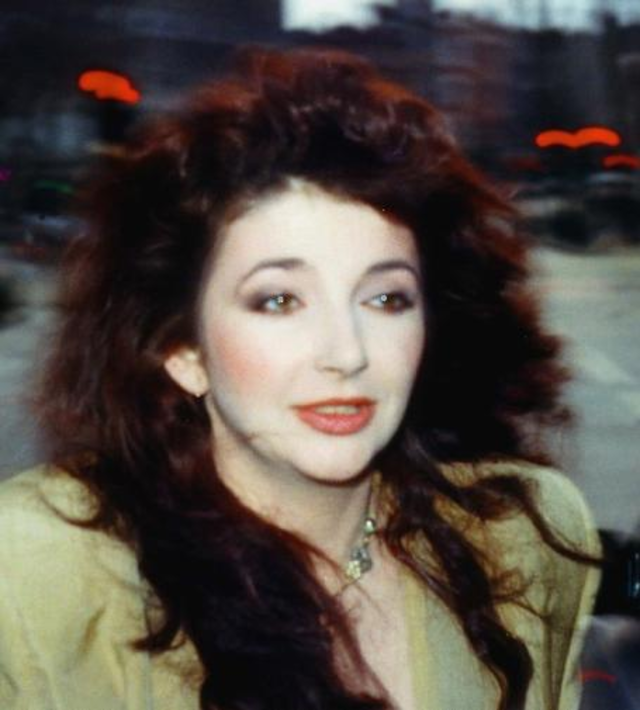“How long do you think before she’ll go out, woman? / Hey, get up on your feet and go get it now / Like it not, we keep bouncing back,” Kate Bush sings in “Room for the Life” the 12th track from her 1978 debut album “The Kick Inside.” She ends the verse with a steadfast affirmation: “Cause we’re woman.”
Kate Bush was 19-years-old when she released “The Kick Inside,” having written some of the songs when she was only 15. Over the course of her prolific music career, she would release nine more studio albums between 1978 to 2011.
I discovered Kate Bush and her music about two years ago – now the vinyl album cover for “The Kick Inside” hangs proudly above my desk. Her lyrics, filled with achingly confessional lines, layered wordplay and unconventional experimentation with playful nonsense, never fail to make themselves tangible. With characteristic floats, flings, lilts and dips, her vocal tone evokes an ethereality that is equal parts tender and theatrical. The music itself defies easy categorization, as the characteristic sounds of the 1970s, ‘80s and ‘90s serve as mere backdrops to a genre and palette that is purely her own.
Most notably, her artistic vision— and her command of it— has taught me to unapologetically embrace the rich inner life that is the female imagination.
I’d like to define the term “female imagination” as the wide spectrum of creative impulses, desires and experiences that are common to the female social identity, and thus, are usually subject to suppression by patriarchal habits. Yet, with Kate Bush, the female imagination is celebrated.
In lines such as “And if I only could / I’d make a deal with God / And I’d get him to swap our places.” from her 1985 song “Running Up That Hill (A Deal With God),” Kate Bush acknowledges the common dismissal of female emotion within male and female couples. In a 1992 interview she explains, “And if we could actually swap each other’s roles, if we could actually be in each other’s place for a while, I think we’d both be very surprised! And I think it would lead to a greater understanding.”
Kate Bush’s lyrics reach female conditions far beyond her own experiences. She commonly dons theatrical personas and intricate storylines such as the ghost of Catherine Earnshaw in “Wuthering Heights,” a murderous bride in “The Wedding List,” a dead soldier’s mother in “Army Dreamers” and a scheming wife in “Babooshka.” Though these characters differ greatly from one another, they are all explicitly and unapologetically female.
Her wide range of characters represents an equally wide range of female experiences and emotions. Some characters take the form of common archetypes such as mothers, wives and young girls in love. Others are abstract, violent or downright fantastical.
Through characters – feelings of tragedy, rage, sexuality, euphoria, frustration and love are given the realistic dynamics they deserve. Her music creates a world in which we are invited to indulge in the inevitable swing between fervor and tranquility, and she approaches it all with poetry, always. The line of performative melodrama never comes close to being crossed. In a time when emotional vibrancy in women is often discarded as hysteria and over-sensitivity, Kate Bush’s artistic vision never fails to take these characters and their emotions completely seriously.
The command and certainty in which she holds her artistic vision has inspired numerous modern female artists such as Tori Amos, Björk, Joanna Newsom, St. Vincent and Mitski. Imogen Heap, the British alternative-pop singer stated in an interview with Complex,“It was the likes of Kate Bush who had contributed to labels taking me seriously as a girl who knew what she was doing and [what she] wanted’, enabling her to ‘experiment and [be] left to [her] own devices in the studio.” Additionally, Big Boi, a rapper in the hip hop duo Outkast, has called Kate Bush one of his biggest musical inspirations, stating “the complexity of the music itself is what drew me to her.”
She was one of the first to experiment with the Fairlight synthesizer, designed her own elaborate stage performances, produced her own albums and pioneered an entirely new sound of bass-driven ethereality that was years ahead of its time. Despite this, critics of Kate Bush often treated her as though she were simply a muse of her own creation— a female artist with a witchy gimmick aesthetic who got lucky in the music industry. In my opinion, a lot of people didn’t know what to do about a woman who stood so firmly against the limitations that conventions would have on her music. Her music was as weird as she wanted it to be. She didn’t care.
To reiterate the sentiments of New Yorker writer, Margot Talbot, in her article about Kate Bush, the indomitable self-devotion of Bush’s art evokes a comparison to a line from Virginia Woolf’s “A Room of One’s Own”: “What genius, what integrity it must have required in the face of all that criticism, in the midst of that purely patriarchal society,” Woolf writes, “to hold fast to the thing as they saw it without shrinking.”
Kate Bush has taken a well-deserved rest from her non-stop music production and withdrawn completely into her secluded England estate for the past few years, but in no way has her art ever shrunk away.
“Pray God you can cope / I stand outside this woman’s work / This woman’s world” whispers Bush in “This Woman’s Work”. And yes, what a sacred place it can be to stand within the world of womanhood. What a joy it is to hear her music as she invites us to dance ever closer to understanding the rich, inexhaustible epicenter of women’s work.
Kelly McMahan can be reached at [email protected]



















